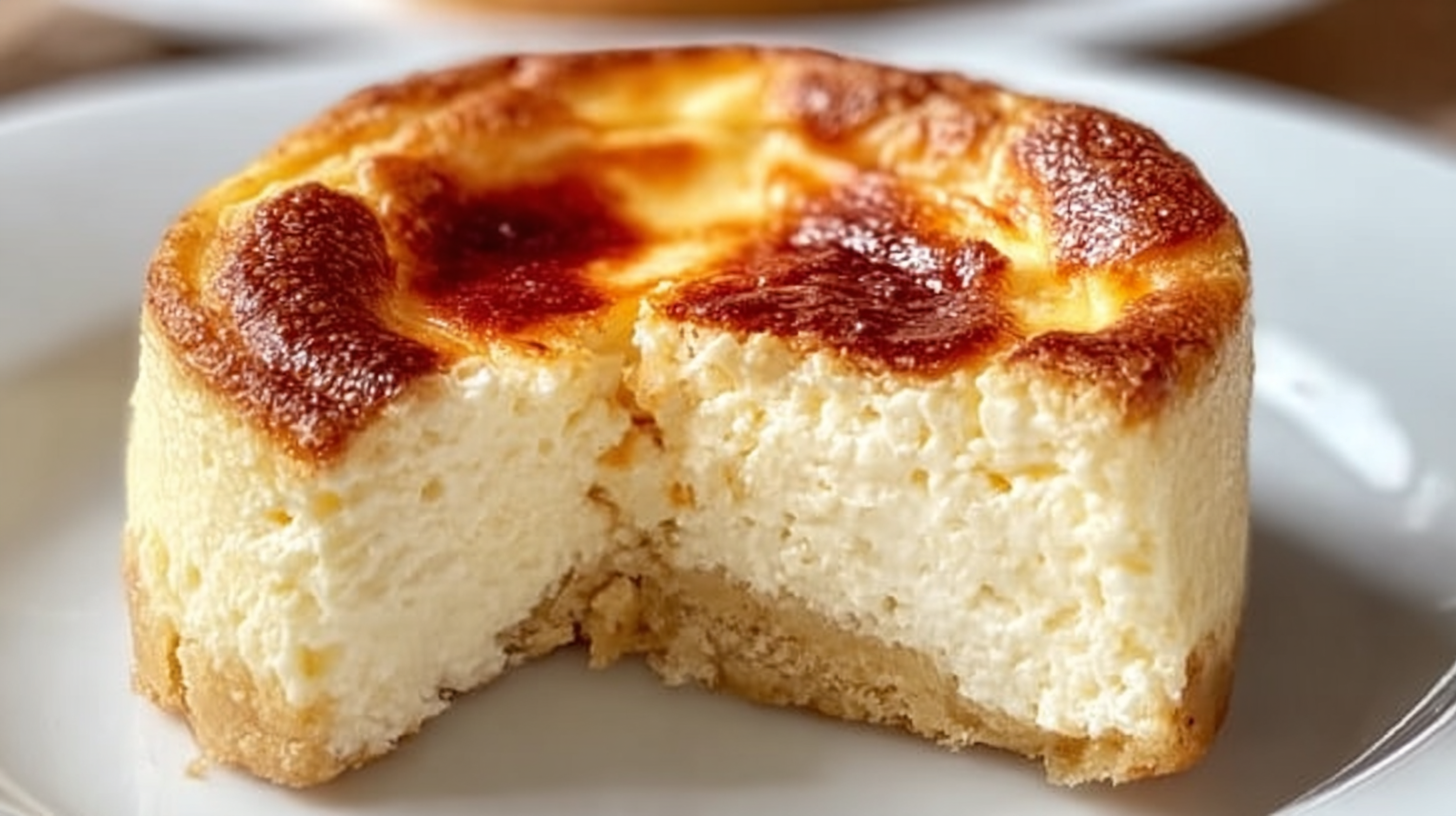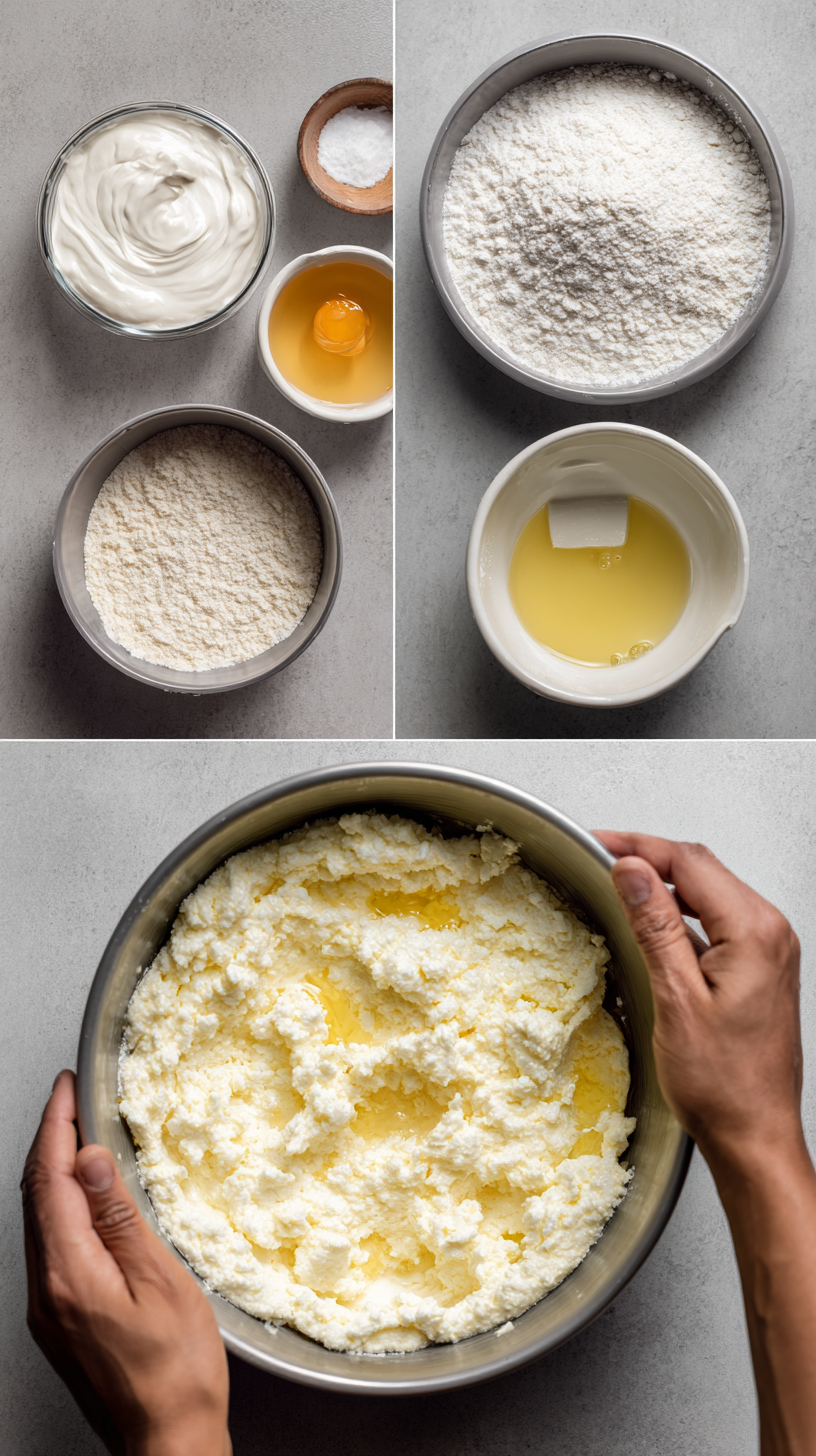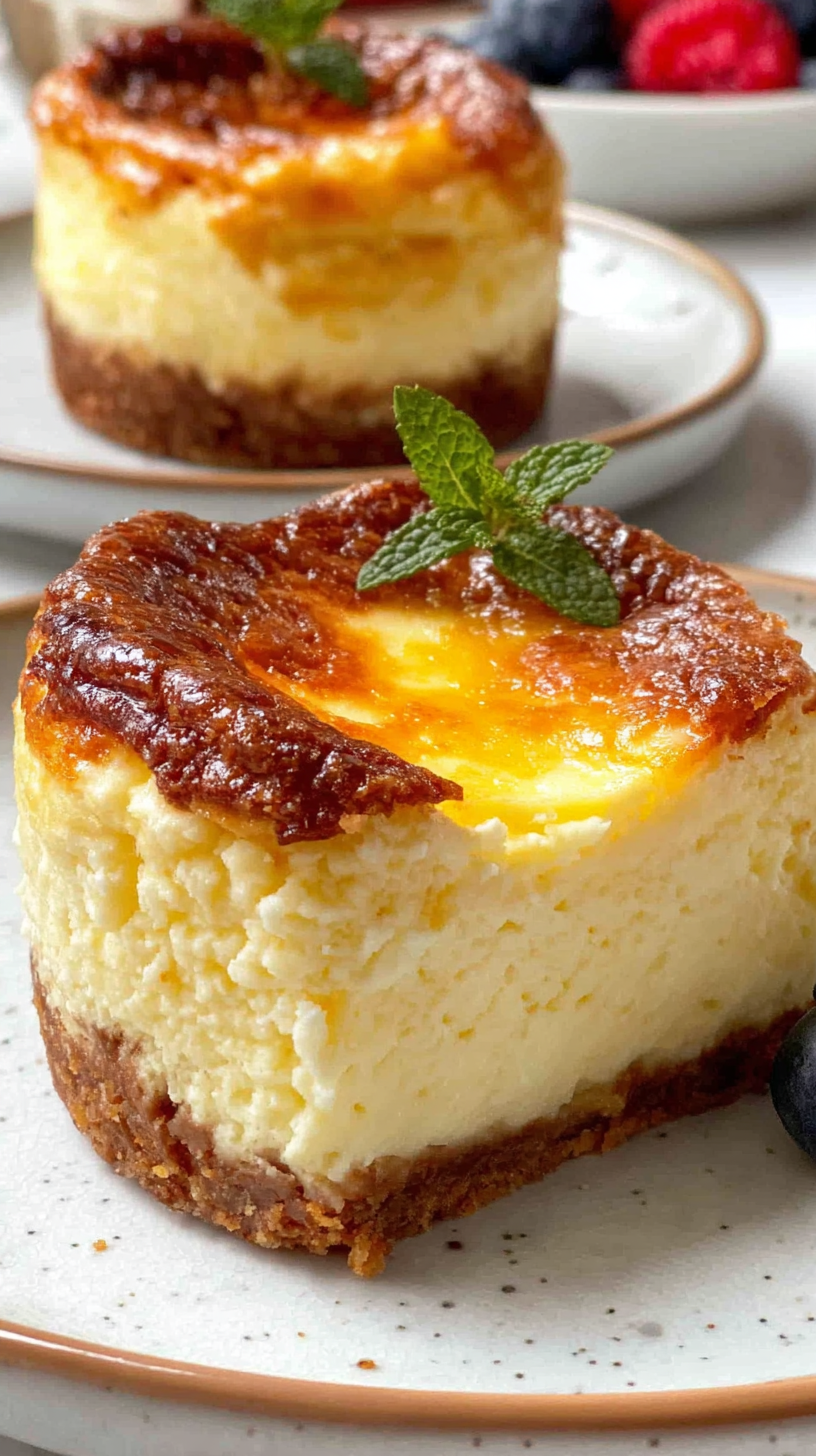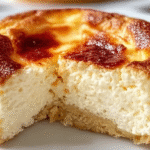The Memory Behind This Treat
I remember the first time I attempted a Mini Protein Keto Cottage Cheese Cheesecake. It was a Sunday afternoon, the kind where the kitchen was filled with the warmth of nostalgia, and I had a craving for something sweet yet guilt-free. My grandmother, who taught me the beauty of making desserts with love, always believed that the best treats come from humble beginnings. As I blended the cottage cheese and Greek yogurt, I could almost hear her whispering encouragement, nudging me to explore new flavors but never to forget the basics.
On that day, the house was full of laughter, as my daughter and I attempted to get the almond flour crust just right. I chuckled at her insistence on tasting every component, making sure it measured up to her young standards. The aroma of vanilla filled the air, and it was as if time slowed down—a reminder that moments like these are the true essence of cooking. The first bite of those cheesecakes was a revelation; they were creamy, subtly sweet, and incredibly satisfying.
Creating these mini delights transformed a simple afternoon into a cherished memory. The process reminded me of the joy in experimenting with wholesome ingredients while maintaining a keto-friendly lifestyle. Every time I prepare these cheesecakes now, I’m taken back to that sunny Sunday, filled with laughter and the comforting thought that even health-conscious desserts can carry the warmth of tradition.
How To Make It (Mix & Ingredients)
Creating these Mini Protein Keto Cottage Cheese Cheesecakes is a breeze, even on a busy day. Start by grabbing your blender or food processor—trust me, this little appliance will be your best friend for this recipe! You’ll want to blend together the cottage cheese, Greek yogurt, eggs, powdered erythritol, vanilla extract, and a pinch of salt until the mixture is smooth and creamy. This blend gives the cheesecakes their rich, creamy texture while keeping them low-carb and high in protein—perfect for satisfying your sweet tooth without the sugar spike.
Meanwhile, in a separate bowl, mix the almond flour and melted butter. This will form the deliciously crumbly base for your cheesecakes. Press a spoonful of this mixture into each lined mini muffin cup, creating a sturdy crust that supports the creamy filling. Pour the cottage cheese mixture over these crusts, filling the cups to the brim. Baking is simple—just pop them into a preheated oven at 325°F (165°C) for about 15 to 20 minutes, until they are set and slightly golden on top.
Once baked, let them cool and then chill in the refrigerator for at least 2 hours. This chilling time is crucial for the flavors to meld and the texture to set properly. When you’re ready to indulge, top them with fresh berries or a dollop of whipped cream if you like. These little delights are perfect for meal prep, so feel free to make a batch ahead of time. They’ll keep in the fridge for 4 to 5 days, or you can freeze them for a later craving. Enjoy this creamy, dreamy, guilt-free treat!
Make-Ahead & Storage
Wondering how to keep your Mini Protein Keto Cottage Cheese Cheesecake fresh and delicious? You’re in luck! These delightful mini cheesecakes are perfect for preparing in advance. Once you’ve baked them to golden perfection, let them cool completely before placing them in an airtight container. You can store them in the refrigerator for up to 4–5 days, making them a convenient option for a quick, healthy snack throughout the week. Just imagine opening the fridge to find these creamy treasures waiting for you!
If you’re planning for a longer-term supply of these keto-friendly delights, freezing is a fantastic option. After cooling, wrap each cheesecake individually in plastic wrap or aluminum foil before placing them in a freezer-safe bag. This way, you can prevent freezer burn while keeping them fresh. They’ll last up to 2 months in the freezer. When you’re ready to indulge, simply thaw them in the refrigerator overnight. The texture remains smooth and satisfying, just like the day you made them.
Whether you’re meal prepping for the week or planning a future indulgence, these mini cheesecakes are a versatile addition to your keto repertoire. They’ll be ready to curb those cravings without a hitch. And if you’re curious, try pairing them with a dollop of sugar-free whipped cream or a sprinkle of fresh berries for an extra touch of decadence!
Best Ingredients & Party Variations
When crafting these Mini Protein Keto Cottage Cheese Cheesecakes, choosing the right ingredients is crucial for achieving that perfect balance between flavor and nutrition. Cottage cheese is the star here, offering a creamy texture and a protein punch. Opt for full-fat cottage cheese if you want extra creaminess, but low-fat works well too, keeping the cheesecakes light. The almond flour crust adds a nutty flavor with fewer carbs compared to traditional flour, making it an excellent choice for keto enthusiasts. Don’t skip the powdered erythritol; it sweetens without spiking your blood sugar. Remember, it’s all about keeping those carbs low and the flavor high!
Now, let’s have some fun with variations to impress your party guests. For a zesty twist, add a teaspoon of lemon zest to the batter for a refreshing citrus note. Hosting a holiday gathering? Sprinkle in some pumpkin spice and top with a dollop of sugar-free whipped cream for a cozy autumn treat. If you’re feeling tropical, a dash of coconut extract and a sprinkle of unsweetened shredded coconut on top can transport your taste buds straight to a sunny beach. Whichever direction you choose, these mini cheesecakes are versatile enough to suit any occasion. They keep your party deliciously low-carb and guilt-free!
FAQ’s About Mini Protein Keto Cottage Cheese Cheesecake
Is cottage cheese keto-friendly?
Absolutely! Cottage cheese is a great option for keto diets due to its high protein content and relatively low carbs. Opt for full-fat versions to maintain the desired fat-to-carb ratio that keto enthusiasts aim for. Just keep an eye on portion sizes, as carbs can add up quickly if you’re not careful. It’s a creamy, satisfying way to enjoy dairy without breaking your carb bank.
How do you use cottage cheese in cheesecake?
Using cottage cheese in cheesecake is wonderfully simple and adds a protein boost. Blend it until smooth to mimic the texture of cream cheese. This approach lightens up the cheesecake while maintaining that creamy, indulgent feel. In our mini cheesecakes, we complement the cottage cheese with Greek yogurt and eggs for a rich, smooth filling that holds up beautifully.
How can cottage cheese protein aid in weight loss?
Cottage cheese is packed with protein, which helps keep you full and satisfied longer—a great perk when trying to lose weight. Its high protein content can boost metabolism and support muscle maintenance while you’re shedding pounds. Adding it to recipes like our mini cheesecakes allows you to indulge in a sweet treat without sacrificing your health goals. Plus, its versatility makes it easy to incorporate into various meals and snacks.
What is cottage cheese mainly used for?
Cottage cheese is a versatile ingredient used in both savory and sweet dishes. It’s perfect for breakfast with fruit, in salads for a protein punch, or as a creamy base in dishes like lasagna or these delightful mini cheesecakes. Its mild flavor pairs well with a variety of ingredients, making it a staple in many kitchens. Whether you’re using it as a spread, in smoothies, or baked goods, cottage cheese can easily fit into a healthy eating plan.
Conclusion
Making these Mini Protein Keto Cottage Cheese Cheesecakes is more than just whipping up a dessert—it’s about creating moments that bring joy and togetherness. Whether you’re enjoying a quiet evening with family or hosting a keto-friendly gathering, these little treats add a touch of sweetness to any occasion. The creamy texture and delightful flavor will surely have everyone coming back for seconds.
Why not take a moment to try this recipe yourself? It’s a simple yet rewarding way to indulge in something delicious while staying true to your health goals. And remember, the best part of cooking is sharing the results with those you love.
For more delicious recipes like this, follow us on Facebook and Pinterest! Join our community and let’s create more tasty memories together!
PrintDiscover Mini Protein Keto Cottage Cheese Cheesecake Bliss
- Total Time: 30
- Yield: 12 mini cheesecakes 1x
- Diet: Gluten Free
Description
Prep time: 10 m
Ingredients
1 cup cottage cheese (full-fat or low-fat)
1/2 cup unsweetened Greek yogurt
2 large eggs
1/4 cup almond flour
2 tbsp melted butter
1/4 cup powdered erythritol (or your preferred sweetener)
1 tsp vanilla bean paste
1/4 tsp salt
Instructions
1. Preheat the oven to 325°F (165°C) and line a mini muffin tin with paper liners.
2. In a blender or food processor, blend the cottage cheese, Greek yogurt, eggs, erythritol, vanilla bean paste, and salt until smooth and creamy.
3. In a separate bowl, combine the almond flour and melted butter. Mix until crumbly.
4. Spoon the almond flour mixture into the bottom of each muffin cup and press down lightly to form a crust.
5. Pour the cottage cheese mixture over the crusts, filling each muffin cup.
6. Bake for 15-20 minutes, or until the cheesecakes are set and slightly golden on top.
7. Allow the cheesecakes to cool, then refrigerate for at least 2 hours before serving.
8. Top with fresh berries or whipped cream if desired.
Notes
Sweetener Options: Feel free to adjust the sweetness to your taste. If you prefer another sweetener, such as stevia or monk fruit, you can swap it with the powdered erythritol. Just ensure you adjust the quantity to avoid over-sweetening.
Make-Ahead: These mini cheesecakes can be made ahead and stored in the refrigerator for up to 4-5 days.
Freezer Friendly: You can also freeze them! After they cool, wrap them in plastic wrap or store in a freezer-safe container for up to 2 months.
- Prep Time: 10
- Cook Time: 20
- Category: Dessert
- Method: Baked
- Cuisine: American
Nutrition
- Serving Size: 1 mini cheesecake
- Calories: 130 kcal
- Sugar: 2 g
- Sodium: 140 mg
- Fat: 10 g
- Saturated Fat: 5 g
- Unsaturated Fat: 3 g
- Trans Fat: 0 g
- Carbohydrates: 5 g
- Fiber: 2 g
- Protein: 7 g
- Cholesterol: 55 mg




